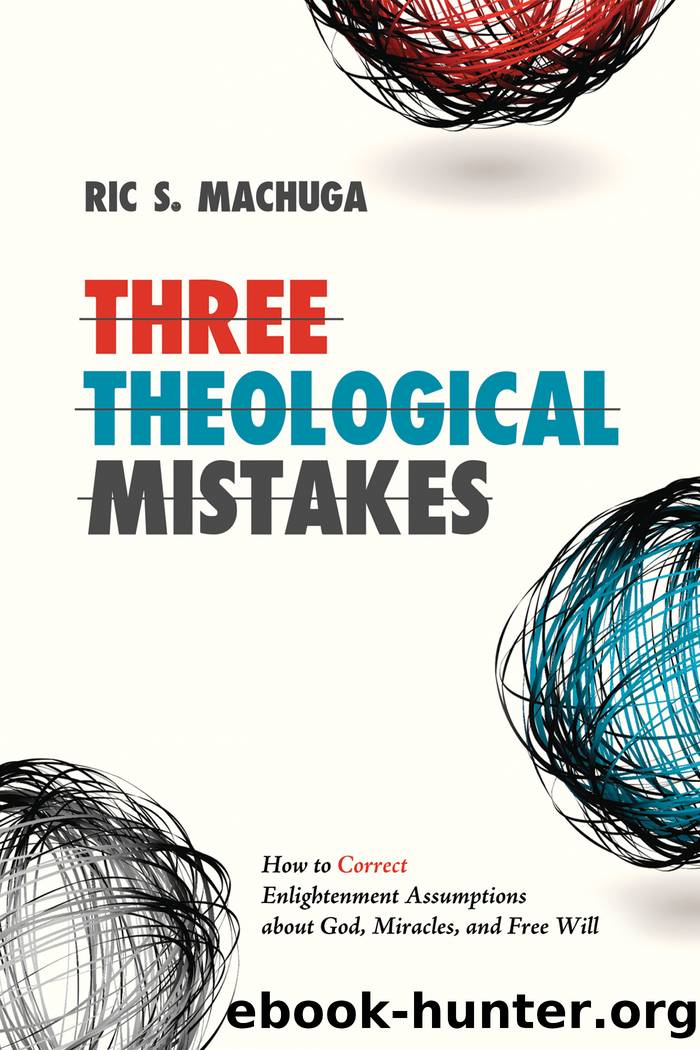Three Theological Mistakes by Machuga Ric;

Author:Machuga, Ric; [Machuga, Ric]
Language: eng
Format: epub
ISBN: 9781630877774
Publisher: Wipf and Stock Publishers
Published: 2015-01-27T08:00:00+00:00
The church is to Christian ethics what the family and community are to virtue ethics. As we said earlier, all babies are born helpless because they are biologically speaking about seventeen months premature. At one time, we were all utterly dependent upon the family and community into which we were born. While other mammals are richly âhardwiredâ with abilities and instincts for survival, we are not. Just as we cannot learn virtue without instruction from family and friends, we cannot learn the ethics of grace without the church.201
If a person were born into the kind of good society weâll describe in the next chapter, even if it knew nothing about Christianity, then that person could expect to receive instruction in the universal human struggle to overcome the fear of pain (courage) and the temptations of sensual pleasure (temperance). But the Christian has an additional struggle. As St. Paul says, we are contending against âprincipalities and powersâ (Eph 6:12). Barth describes these as
the hidden wirepullers in manâs great and small enterprises, movements, achievements, and revolutions. They are not just potencies but the real factors and agents of human progress, regress, and stagnation in politics, economics, scholarship, technology, and art, and also of the evolutions and retardations in all the personal life of the individual. It is not really people who do things, whether leaders or the masses. Through mankindâs fault, things are invisibly done without and above man, even above the human individual in all his uniqueness, by the host of absolutisms, of powers that seek to be lordless and that make an impressive enough attempt to exhibit and present themselves as such.202
It is only in the church and its sacraments that we are continually reminded that Jesus âdisarmed the principalities and powers and made a public example of them, triumphing over them on the crossâ (Col 2:15). If this is ever forgotten, the ethics of grace will die.
Most importantly, it is within the church that we are instructed in the indicatives of Christian doctrine so that the imperatives of grace become obvious. But how, we are tempted to ask, can the imperative for Mrs. Bergmeier become obvious? Isnât it pure folly, or perhaps arrogance, to think that inside the church all moral dilemmas simply melt away?
Not if we understand the most frequent command in the New TestamentâBe not anxious!âand the syllogism from which it follows:
1. The imperative always follows the indicative.
2. God is for us.
3. Therefore, be not anxious.
First, by definition, a moral dilemma requires that there be at least two moral rules in opposition. By focusing our ethical reflection on the above syllogism this definitional requirement for a dilemma is eliminated. Certainly there is no biblical injunction to be fearful. Yet, what other command could be in opposition to the command: Be not anxious?203
Second, what is true of Aristotelian virtue ethics is all the more true of Christian ethics: our understanding of virtue is always tested in an essay; never by a true or false question. The thing that gives âmoral dilemmasâ
Download
This site does not store any files on its server. We only index and link to content provided by other sites. Please contact the content providers to delete copyright contents if any and email us, we'll remove relevant links or contents immediately.
What Is the Gospel? (Foreword by D. A. Carson) by Greg Gilbert(951)
Daily Strength: Devotions for Bible Believing Study by Douglas Stauffer & Andrew Ray & Rick Quatro(854)
Christian Ethics by Wilkens Steve;(765)
The Practice Is the Path by Tias Little(757)
New Morning Mercies by Tripp Paul David(755)
Jesus in Me by Anne Graham Lotz(715)
Veritas: A Harvard Professor, a Con Man and the Gospel of Jesus's Wife by Ariel Sabar(691)
Cleaning Up Your Mental Mess by Dr. Caroline Leaf(673)
Greatest Mystery in the World by Og Mandino(608)
The Creative Call by Janice Elsheimer(528)
No More Christian Nice Guy by Paul Coughlin(527)
Our Appointment with Life by Thich Nhat Hanh(525)
2084 by John C. Lennox(507)
This One Wild and Precious Life by Sarah Wilson(494)
Monastic Archaeology by Unknown(493)
Jesus--Awesome Power, Awesome Love (Discover 4 Yourself® Inductive Bible Studies for Kids) by Kay Arthur(490)
The Duties of Parents by J.C. Ryle(468)
The Tale of the Tardy Oxcart (Swindoll Leadership Library) by Swindoll Charles R(445)
A Closer Talk with God: Scriptural Prayers for Women by Kim Trujillo(434)
